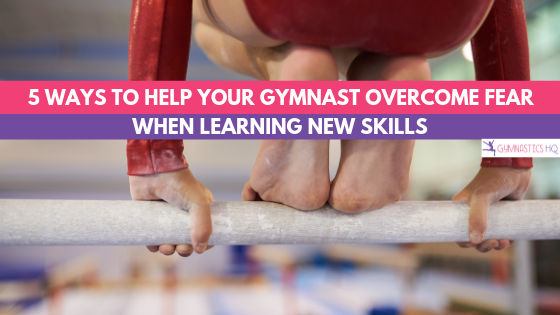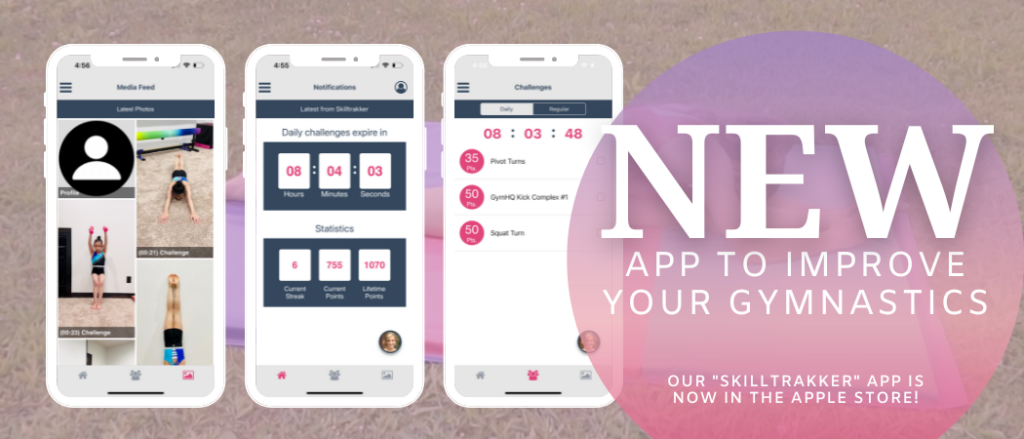
It’s summer time and most gymnasts are doing up-training which means learning a whole new set of skills in preparation for next year’s competition season. While it’s often a fun time of year that gymnasts look forward to, it can also be filled with anxiety as gymnasts are attempting to learn challenging skill they don’t yet feel comfortable doing.
If you have a gymnast who has fear around trying and learning new skills, you don’t have to just sit back and watch helplessly. There are some things you can do as a parent to help her overcome her fear as she goes through this process.
Read below as we give you a list of 5 ways you can help you gymnast overcome fear when learning new skills.
Number 1: Acknowledge her fear
Nothing is more frustrating when feeling fear than being met with “Oh, it’s not that scary” or “You’ll get it, just keep trying” or “Your coach wouldn’t make you do anything you can’t do.” When your gymnast is feeling scared she needs support and acknowledgment that her fear is legitimate. While it might feel like giving her encouraging words would help, the truth is they might do more harm than good.
Why? Remember when we told you how gymnastics is one of the most difficult sports in the world? Well, we weren’t lying nor were any of the scientists who did the research! Your gymnast has a right to be fearful of trying new skills because those skills are scary and potentially dangerous. Her body has gone into flight-or-fight mode and is modeling the flight response to evade danger. So the best thing you can do to support her is to acknowledge that her fears are valid and real. Things like “I can only imagine how scary it must be learning that flyaway on bars. I would be scared too if I was trying it” or “A back handspring on beam is a really hard skill and I bet it feels scary to learn it” are all ways to acknowledge her fear without making her feel wrong for being afraid to try that challenging skill.
While you might think that saying your gymnast’s fears out loud would put doubts in her head, the truth is that although she might not realize it, she’s already having those feelings if she’s scared. So the best thing to do is to validate her feelings out loud to let her know her feelings are understood and completely ok. In time her body’s flight response will subside and she’ll feel more confident in trying that skill. Until then, acknowledgement can really help.
Number 2: Encourage her to do mental work through visualization
The best way to learn and perfect any new skill in gymnastics is through visualization, yet it’s the most underused skill of all. Before your body can learn a new pattern of movement, it must have an idea of what it needs to do. Just watching a skill is not enough for your gymnast to have the confidence to execute it herself. That’s why visualization is so important.
As a parent, you can encourage your gymnast to practice visualizing the skill she is trying to learn daily. During visualization she should close her eyes and imagine herself doing the skill she is trying to learn. Encourage her to feel herself doing the skill as if she is actually doing it so that she can feel the movement pattern. She can also imagine looking at herself doing the skill as if she is a spectator in the audience. Just like practicing conditioning skills everyday, a mental workout should be part of her daily to-do list over the summer.
Just be aware that visualization can take time to learn. For a young gymnast, it might be difficult for her to learn how to really see herself doing a skill. If she struggles with visualization and gets frustrated, don’t push it. But in that case you can encourage her to use words to describe how doing the skill might feel to her – such as, it feels like “flying through the air” or “spinning fast” or “being solid on the beam.” Feeling the movement in her body is equally as important so if visualization isn’t working, talk about how the skill might feel to her if she were to do it. The idea is to give her body a chance to become familiar with the skill long before she can do it.
Number 3: Be an advocate for your gymnast
While there are great coaches out there who understand fear and are accepting of gymnasts’ hesitation when learning new skills, it’s also likely that some have not been trained in sport psychology techniques. One of the reasons gymnasts balk or bail out of trying a new skill is because they are pushed too quickly into learning that skill. The fight or flight response takes over whenever a gymnast feels herself being put into a dangerous situation and in the case of gymnastics, just about any new skill is a fight or flight worthy situation. The best way to conquer fear and learn new skills is to start small. We’re talking baby steps. This makes the process of learning a skill much slower, but it also helps to ensure that these skills are performed more consistently in the future with less balking.
For example, if a gymnast is trying to learn her back handspring-back handspring on beam and consistently bails without a spot then it’s time to rewind and start smaller. This gymnast might start, instead, on the low beam with mats and do this for however long it takes her to feel comfortable. This could be one week or a few weeks. After her body has turned off the fight or flight response she can then change things up by taking away one of the mats on low beam. She would do this until she feels comfortable. If that’s too much of a jump then she might need a spot while trying this skill on low beam without mats. The point is, this process takes time and consistent effort until she feels comfortable. Then a small jump can be made so that your gymnast can be pushed slightly outside her comfort zone again.
As a parent, it’s helpful to advocate for your gymnast if you see she is being pushed to try skills in a way that are evoking fear in her. You might have a private conversation with her coach and ask her or him to collaborate with you and the gymnast on a plan that consists of gradual challenges in learning the skill, as opposed to being asked to do it all at once. But the bottom line is that doing skills that evoke fear can elicit fear in other skills that were never a problem so be sure you’re being an advocate for your child if you see she’s being pushed in a way that is counterproductive to her success. While its equally important to trust your gymnast’s coach, also remember that you know your gymnast better than anyone else.
Number 4: Celebrate small victories
When learning new skills it’s easy for your gymnast to have some days that feel victorious with others that feel downright defeating. To combat this, find little victories to focus on. Maybe your gymnast was too afraid to do a back handspring on low beam without any mats, but she got up there and tried one extra time when compared to the practice before. Celebrate! Maybe she approached the vault table but then balked when it came time to do her vault, but she had the fastest run you’ve seen yet. Celebrate!
Every part of learning a new skill is hard so it’s important to shift your gymnast’s focus on all the things that ARE going in the right direction, as small as they might be. If she’s constantly leaving the gym in tears or upset about not having gotten her new skill then you can be sure she’s going to focus on that the next day and the next time she goes to try that skill. Your job is to help her break out of this pattern of thinking and to switch her thoughts around slowly to a more positive way of thinking.
It’s also important to note that sometimes there are no small victories that are related to the skill she is trying to learn but there might be some that are related to other skills she’s doing or her effort in the gym. Praise these. You can celebrate anything as long as you are getting your gymnast off the subject of feeling fear and frustration and onto the subject of feeling victorious.
Number 5: Remember, this too shall pass
At the end of the day it’s worth it to remember that “this too shall pass.” As parents of gymnasts (and as parents in general) we can fall into the trap of putting too much weight on a negative situation as it’s happening. It’s alright to feel the stress of a situation, especially if your gymnast is really struggling. But remind yourself that this frustration shall pass and that eventually she’ll learn the new skill, regardless of how long it takes her. Don’t get too attached to the negative situation as it’s happening. Rather, remember that hard moments are only temporary.
Also know that overcoming frustration is an experience that will teach your gymnast grit which is a quality needed by all gymnasts in order to succeed. Grit is having courage and resolve. Without stress, courage and resolve cannot be learned. So moments like these are actually gifts to your gymnast. If you can change your thinking around to accept fear and frustration as part of the journey of gymnastics then you can approach these tough moments with a whole new perspective. And reminding your gymnast of this perspective can help her move through this stage faster, too.
Gymnastics is by far one of the most difficult sports to learn which is why learning new skills can evoke fear in your gymnast. It’s important to acknowledge her fears so she feels validated in her response. Sometimes doing that alone is enough to give your gymnast more confidence. Encourage your gymnast to practice her mental routines daily and make sure you’re an advocate for your gymnast if you see she is being pushed well beyond her comfort zone. Celebrate her small victories along the way and remind yourself that this fear and frustration shall pass in time! This is only a temporary situation and she (and you) will get through this.



hnbcj dnjdn September 30, 2020, 1:13 pm
Men do gymnastics too
Alisha October 10, 2022, 7:53 pm
I am completing in the Olympics but I fear that I will fail
gymnasticshq October 14, 2022, 12:42 pm
Good luck!